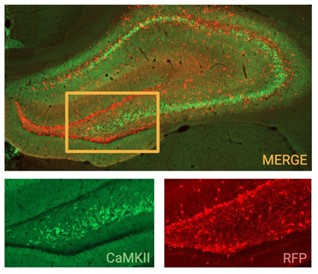
What is BCN and how does it create meaningful change?
BCN uses animal models to investigate neural systems and the underlying mechanisms of behavior. BCN faculty have research laboratories that investigate various aspects of learning, mood and stress disorders, addiction, and neural injury. BCN faculty teach many undergraduate psychology and neuroscience courses in the department, as well as train graduate students earning a PhD in Psychology or Neuroscience (via TAMIN).
There are currently six BCN faculty:
Carlos Bolaños investigates how exposure to psychotropic drugs (e.g., anxiolytics, antidepressants) and stress (whether physical or emotional) modify the integrity of neural pathways involved in regulating mood and motivated behaviors, and how these pharmacological and/or environmental insults early-in-life affect biochemistry and behavioral functioning later in adulthood.
Shoshana Eitan’s research team is working to develop better ways to treat mental health conditions, with a recent focus on depression. Depression affects about 280 million people worldwide. Yet, around 60% of patients experience only a 50% improvement with current treatments, and one-third don’t respond at all. Despite how common it is, the root causes of depression are still not well understood. The lab is currently studying the involvement of nuclear receptors in mood regulation and is in the process of patenting promising compounds that could lead to new, more effective treatments.
James Grau: Events that induce a neural injury (e.g., a car accident) are often accompanied by other tissue damage, which engages pain fibers. Dr. Grau’s research has shown that pain after a brain or spinal cord injury engages processes that increase the area of neuronal loss. He has gone on to show that blocking brain activity, by inducing a coma-like state, can prevent this effect and promote long-term recovery.
Justin Moscarello: The emotional landscape of your life is shaped by an elaborate network of associations that you learn and remember but may not be consciously aware of. Research in the Moscarello Lab explores these implicit associative memories on a psychological, behavioral, and neurobiological level. Focusing on aversive learning in a rodent model, work in the lab leverages the toolkit of contemporary neuroscience to dissect the brain systems and circuits that allow experience to shape both adaptive and pathological forms of defensive behavior.
Rachel Smith uses rodent models of drug self-administration to investigate the neural mechanisms of drug addiction. The research lab is interested in understanding why individuals continue to use drugs, even in the face of negative consequences. The lab is investigating the role of habits and behavioral inflexibility, and the brain systems that underlie these processes.
Sarah Swinford-Jackson investigates the molecular mechanisms and neurocircuitry that govern drug craving. Substance use disorders are characterized by cycles of drug taking, abstinence and relapse. A greater understanding of the neurobiological drivers of drug craving could ultimately lead to new therapeutic strategies to reduce drug craving and thus prevent relapse.
We cannot be more proud of our BCN team of stellar psychologists and all the work they do in their research and fields. Gig em!
